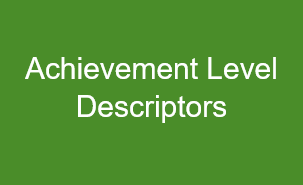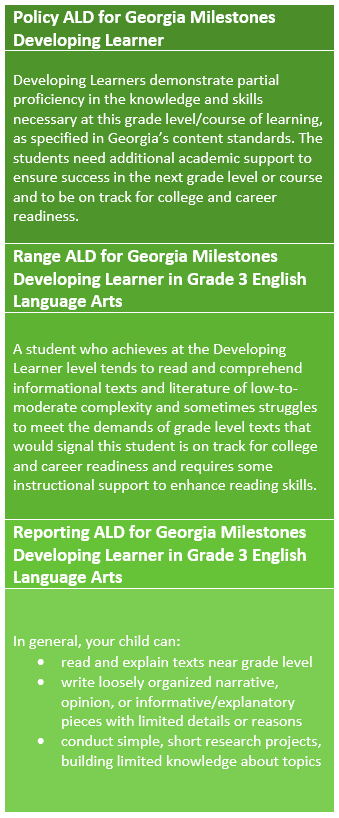The job of assessments is to identify and describe how much content knowledge students have. Achievement levels describe student mastery of the knowledge and skills outlined in the content standards. After instruction, most students have some knowledge of the content described in the content standards for their grade and subject. Achievement levels give meaning and context to scores by describing the knowledge and skills students must demonstrate to achieve each mastery level.
Achievement levels are based on achievement standards. Achievement standards are broad statements of skills and knowledge that students are expected to be able to demonstrate after being instructed on the content standards. Consistent achievement standards for Georgia Milestones and the GAA 2.0 follow from the consistent procedures for developing the assessments. The forms (set of test items) for each grade and content area are constructed to be equivalent, which means that they are built to the same blueprint, content, and difficulty specifications and are administered to students under the same standardized conditions each year.
Achievement standards are a reference point to understand student achievement, and there are two different types of these reference points: criterion-referenced assessments and norm-referenced assessments. Criterion-referenced assessments like Georgia Milestones and the Georgia Alternate Assessment 2.0 (GAA 2.0) are designed to provide information about how well a student has mastered the mandated content standards within a grade or course. In other words, student performance is compared to a set of achievement standards that have been set which range from limited mastery to full mastery of the state's academic content standards. Results from criterion-referenced assessments allow users to make score interpretations of a student's performance in relation to a specified performance standard or criteria (e.g., the achievement levels), rather than in comparison to the performance of other test-takers. They are often reported in terms of achievement levels with descriptors of the skills associated with each achievement level. For example, the Georgia Milestones assessment results are reported using four achievement levels: Beginning Learner, Developing Learner, Proficient Learner, and Distinguished Learner. An example of the 3rd grade English Language Arts achievement level descriptors are shown to the right. Refer to the Georgia Milestones and GAA 2.0 achievement level resource pages for more information about each grade, content area, and course's achievement level descriptors.
One key indicator of achievement is the scale score. Scale scores communicate how students perform on the assessment. Scale scores translate the raw score (the number of points that a student earns on the test) to the reporting scale that is used to compare students in the same grade and content area/course over time. Scale scores are aggregated for student groups and reported at the school, district, and state levels. Achievement levels are translations of the scale scores to specific levels of achievement. Achievement levels provide meaning to the scale scores by providing information about how the student performed on the assessment relative to the performance criteria that are set for the grade and content area/course. For both Georgia Milestones and GAA 2.0, four achievement levels are reported. The achievement levels are accompanied by achievement level descriptors, which are narrative statements that describe the achievement level in terms of what students know and are able to do.
By contrast, norm-referenced assessments are designed to provide information about how well a student has performed in comparison to the performance of other test-takers in the same peer group. Scores from norm-referenced assessments are often reported in terms of percentile ranks. The concordance between the Georgia Milestones and TerraNova scales allows students taking Georgia Milestones to receive information about how they performed compared to a national sample of peers, in addition to how they performed against a test performance standard specific to Georgia's curriculum.
Content standards specify the knowledge, skills, and abilities which form the foundation of instruction and assessment for a given grade and content area.
Achievement standards in turn refer to the levels of mastery of these content standards, as demonstrated on the test. Each achievement level is described by an achievement level descriptor.
Achievement standards are set through a process called standard setting, which is a process with experts that lets those experts make judgments about the content that students in each achievement level should have mastery of. These experts (Georgia educators) provide knowledge of Georgia students, Georgia's content standards, and the curriculum and its application. It is this expertise which gives the standard setting process validity.
Experts consider expectations for students by examining several key materials, including the content standards, descriptions of each achievement level, and the test itself. During the standard setting meeting, committees consider what content students need to have mastery of, and how that corresponds to cut scores. Finally, the experts recommend achievement standards to GaDOE.
Spotlight On: Achievement Level Descriptors
Georgia's assessments report achievement through varying types of achievement level descriptors. In the figure to the right, we see an example of a policy ALD, range ALD, and reporting ALD for Georgia Milestones in Grade 3 English Language Arts.
- Policy ALDs are high-level descriptors that are the same for all content areas and grade levels.
- Range ALDs are grade-level, content-specific descriptors which align closely to the grade-level academic content standards by describing what a student achieving that level may know and be able to do.
- Reporting ALDs summarize the range ALDs in public-friendly language for reports provided to parents, students, and other stakeholders.
More information on Georgia's achievement standards, including the policy, range, and reporting ALDs for each grade, are available on the Testing/Assessment website for Georgia Milestones and the GAA 2.0.



